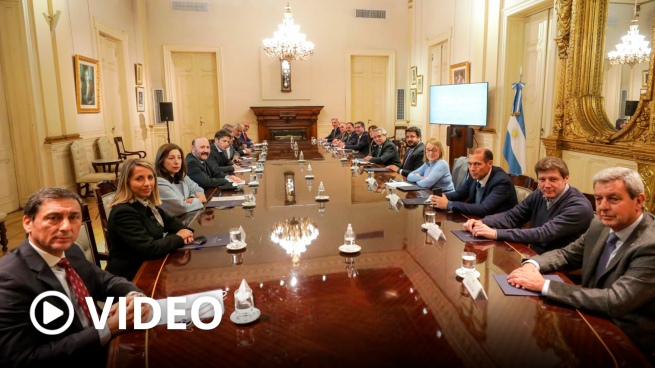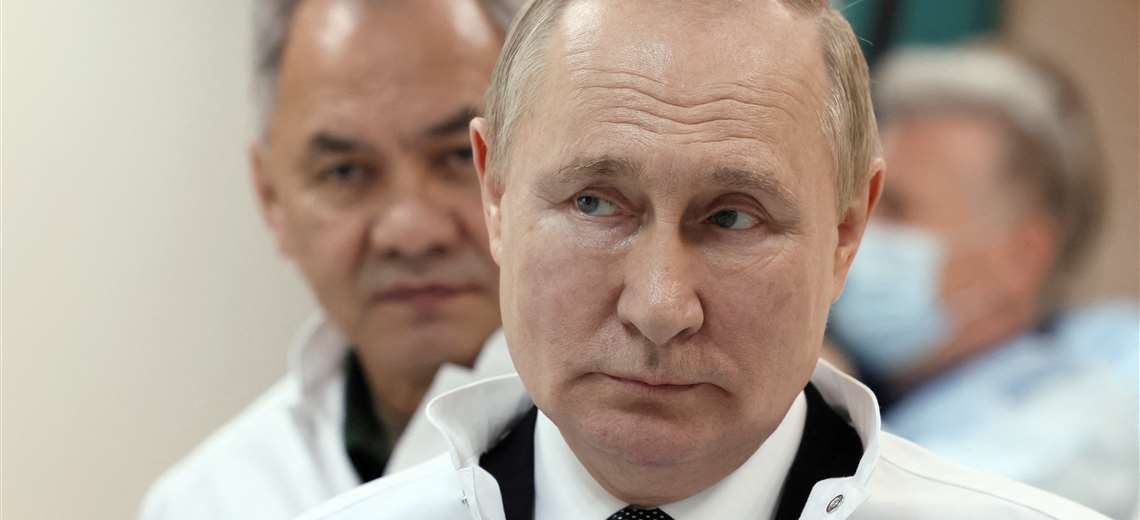The President presented to the governors a project to raise the number of members of the Court to 25
WATCH VIDEO
President Alberto Fernández presented this Thursday before governors and deputy governors of 17 provinces a bill from the Executive Power to raise the number of members of the Supreme Court of Justice of the Nation from five to 25, with the integration of at least 12 women in that bodyofficial sources reported.
The meeting was held in the afternoon in the Eva Perón Room of Casa Rosada, lasted an hour and 10 minutes and also included the participation of a provincial legislator representing Salta.
There, Fernández presented the project that he worked on with the Legal and Technical Secretary, Vilma Ibarra, and the Justice Secretary, Juan Martín Mena, who were also present during the meeting with the provincial leaders.
The proposal, according to reports, has the approval of Vice President Cristina Fernández de Kirchner.
The head of state showed a “democratic and federal” project that prioritizes in its conformation that each one of the provinces be represented, as well as the City of Buenos Aires and the Nation, “with a minimum of 12 women”, an initiative for which the Executive will seek “the endorsement of all the governors”, with whom “he will seek consensus” for his subsequent debate in Congress, the sources told Télam.
Governors Axel Kicillof (Buenos Aires), Raúl Jalil (Catamarca), Jorge Capitanich (Chaco), Mariano Arcioni (Chubut), Gildo Insfrán (Formosa), Sergio Ziliotto (La Pampa), Ricardo Quintela (La Rioja) participated in the meeting. , Omar Gutiérrez, (Neuquén), Arabela Carreras (Río Negro), Alberto Rodríguez Saá (San Luis), Alicia Kirchner (Santa Cruz), Gustavo Melella (Tierra del Fuego, Antarctica and South Atlantic Islands) and Osvaldo Jaldo (Tucumán).
Also in attendance were lieutenant governors Laura Stratta (Entre Ríos), Omar Carlos Arce (Misiones), Roberto Gattoni (San Juan), Carlos Silva Neder (Santiago Del Estero); while for Salta was the president of the provincial Chamber of Deputies, Esteban Amat Lacroix.
Kicillof, Capitanich, Rodríguez Saá, Ziliotto, Carreras and Gutiérrez also spoke at the meeting.
Rodríguez Saá was very appreciative of the project, while Carreras recalled that there is another initiative of the national senator Alberto Weretilneck -ex-governor of Río Negro- that contemplates a Court of 16 members, with the idea of planning one in common.
Later, at a press conference at Casa Rosada, Capitanich said that the project “has representation of one member for each jurisdiction and national State, with gender parity and federal character.”
In this sense, he highlighted the letter of “article 99, paragraph 4, of the National Constitution, in which the President appoints the magistrates of the Supreme Court with the agreement of the Senate by two thirds of its members present.”
The president from Chaco gave examples of the number of members in some countries of the region and said that “Chile has 21, Colombia 23, Costa Rica 21 and Brazil 11”, and pointed out that at the meeting, which he described as “very pleasant “, there were “very interesting contributions from each governor for a corresponding consensus”, although he clarified that “the details of the articles are yet to be defined”.
He indicated that currently “There is a Court with four male members and with that the basic principle of gender parity is broken”, Besides having “a centralist and non-federal conception”.
According to Capitanich, the project “goes beyond a political-partisan confrontation” because it seeks to “build a judicial system, in its highest authority which is the Court, plural, federal, with gender parity and promote specialties in the matter to guarantee a efficient justice” and that it “overcomes antinomies”.
For his part, Kicillof summed up: “The President summoned us to present the project of the Executive Power, which coincides in the central points with which we governors work”.
And he announced that on Friday, the meeting of the Federal Investment Council (CFI) “will aim to unify the criteria to move forward.”
Rodríguez Saá considered that “the initiative will seek to help the country in its judicial system, with a Court that has a lot of work”, in the idea of ”facilitating procedural speed” with “a principle of immediacy”.
He recalled that the first Court “had members from San Juan, Mendoza, Córdoba, Corrientes and Buenos Aires,” and that later the highest court “has moved away from the federal system.”
“Tomorrow (Friday) at the CFI we are going to give birth to the definitive project with what we have discussed with the President,” said the San Luis governor, and said that is it so “very close with a common project” in which they want to include “all the governors”, taking into account that today there were no representatives from the City of Buenos Aires, Córdoba, Corrientes, Jujuy, Mendoza and Santa Fe.
Rodríguez Saá clarified that the current four members of the court, Horacio Rosatti, Carlos Rosenkrantz, Juan Carlos Maqueda, Ricardo Luis Lorenzetti, “will continue in their functions and will join the rest.”
Meanwhile, Ziliotto stated that the governors’ project “ratifies the coincidence with that of the National Executive Power” and considered that this change is “a society demand” that “demands institutional quality.”
For the Pampas governor, “the objective is how we improve the justice service, with a federal Court, agile, efficient and with gender parity”, in which “the deep interior participates in decisions”, and that the highest court ” administer justice for all the inhabitants of Argentina”.
He highlighted the “specialization by rooms, or whatever you want to call them”, to “attack each of the problems”, and stressed that the initiative “is to expand rights”.
“We are on that path from federalism, through the entity that gives us the popular vote”Ziliotto pointed out in relation to “a huge number of governors” to “agree to propose to another power of the State, through deputies and senators”, the search “for the institutional improvement of Argentina with the modification of the current court structure.
Leopoldo Moreau assured that the Supreme Court is “a danger to democracy”
The national deputy for the Front of All (FdT) Leopoldo Moreau considered that the current formation of the Supreme Court of Justice is “a danger to democracy” and evaluated it as an “obstacle” for the guarantee of rights, by supporting the project expansion of this body to 25 members, promoted by the ruling party.
“This Court has become an obstacle to the expansion of rights, the development of the democratic process, the execution of policies that favor the lower-income sectors, and an equitable redistribution of income. Therefore, it is a danger to the democracy,” Moreau assured in an interview for Radio Nacional.
The project in question, promoted by several governors, was presented by President Alberto Fernández with the aim of expanding the number of judges that will make up the Supreme Court of Justice to 25 members, with the intention that all the provinces of the country are represented.
In this regard, Moreau insisted that the idea is gaining a lot of strength in the legislative sphere and pointed out that “the governors’ claim gives it more volume,” although he maintained that “there is also a social claim.”
The legislator trusted that sectors of the opposition outside of Together for Change will accompany this modification to “save democracy from a serious conflict of powers.”
On the other hand, he said that the vice president of the Supreme Court of Justice, Carlos Rosenkrantz, “should decline to participate in any judicial decision that has the government of the Frente de Todos as a counterpart because he has shown strong animosity” and assured that with phrases such as which he has said confronts “not only with this government, but with the popular history of Argentina”.
Rosenkrantz spoke at a conference entitled “Justice, Law and Populism in Latin America”, organized by the University of Chile, where he assured that “there cannot be a right behind every need because there are not enough resources to satisfy all needs.”













